If you can’t get your car to start, it’s frustrating. Unfortunately, starting your vehicle can be difficult for various reasons, from faulty starters to a dying battery.
The problem becomes even more confusing if your vehicle struggles to start after just a few hours of sitting. Low fuel pressure is one of the most common causes of this problem.
The fuel injection system in modern vehicles relies on high pressure; if it’s not maintained and established, things will not work properly. Conversely, low fuel pressure may be caused by various factors listed below.
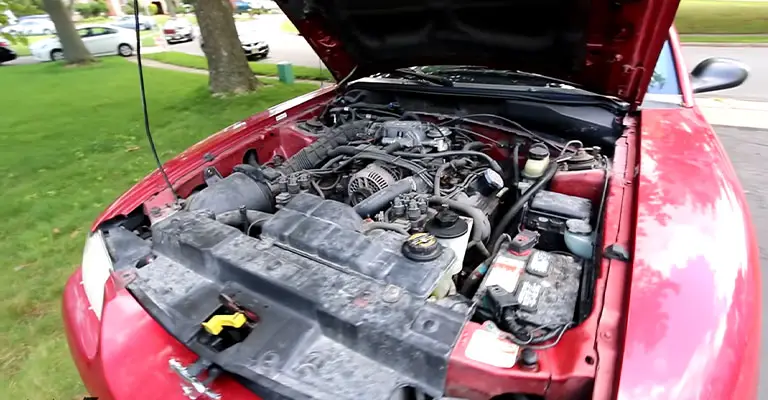
Is The Fuel Injector Clogged?
Clogged fuel injectors can be caused by anything other than a clogged filter. However, injecting fuel into your engine is what these devices do, as their name implies.
To make a good fuel and air mixture, they must spray the right amount of fuel at the right angle. Any change in pressure or even the angle of the spray can adversely affect the mixture.
Despite a good filter, injectors can still become clogged over time, resulting in lower fuel pressure.
There’s A Blockage In The Fuel Filter
As fuel enters the engine, the fuel filter prevents debris and contaminants from entering. Clogged fuel filters can also reduce fuel pressure if they have become clogged.
The car may sometimes stall or sputter if the fuel filter is clogged. It may also have difficulty accelerating.
It’s A Faulty Fuel Pump
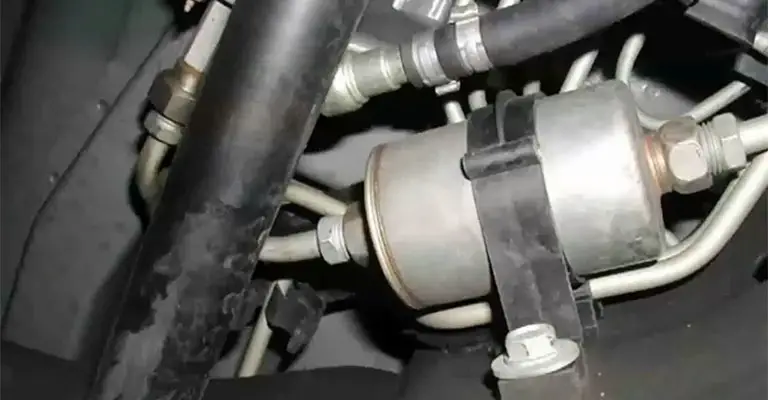
In your engine, the fuel pump injects fuel from the tank into the cylinders, where it can mix with air and cause combustion.
There is a possibility, however, that the fuel pressure may be too low if the fuel pump is not functioning correctly. Low gas mileage and a whining noise are other signs of a bad fuel pump.
What Else Causes A Car To Sputter After Starting Up After Idling?
We will now examine all the possible reasons why a car might sputter when it is starting and their solutions. After reading this article, you will know how to troubleshoot your sputtering car and how to fix it.
There are many reasons why your car might be sputtering when you first start it, but after reading this article, you will know what to do.
1. A Malfunctioning Ignition Switch
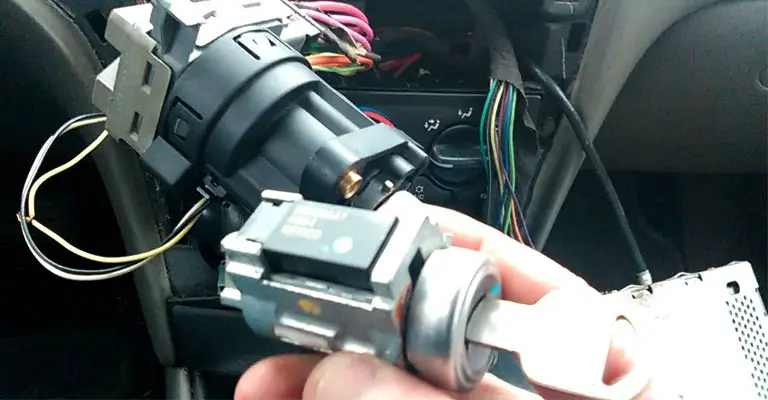
An ignition switch that has failed may be a potential problem. This could be causing the engine not to turn over all the way if the switch isn’t working properly.
If you don’t apply the proper amount of charge, it can cause your car to sputter when you start it.
In this case, the ignition switch is one of the last things to check since a broken ignition switch will most likely prevent the car from starting.
2. Sensor Failures Related To Oxygen
All engine components are monitored by an onboard computer in most modern cars. Oxygen sensors are connected to this and are responsible for regulating fuel flow into the combustion chambers.
A faulty oxygen sensor can cause rich or lean mixtures. After some time, the oxygen sensors become dirty, and they cannot transmit accurate data to the onboard computer. Fuel is released in excess or insufficiently as a result of this.
3. An Inoperable Catalytic Converter
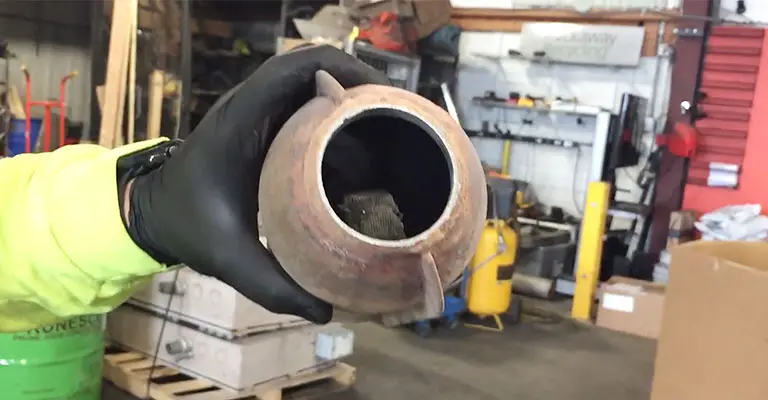
When the catalytic converter fails, it can cause the engine to sputter, as it’s part of the exhaust process. It’s because clean gasses don’t counterbalance the gases that the engine emits, and some might be returning to the engine, causing it to malfunction.
You may be breathing toxic gases into your vehicle’s cabin if your catalytic converter fails. Therefore, if the catalytic converter fails, replacing it is a good idea.
4. An Airflow Sensor That Has Been Damaged
Fuel and air must be mixed correctly in the combustion chamber. An onboard computer in modern engines monitors these components.
By using mass air flow sensors, the combustion chambers are supplied with the correct amount of air.
Saturated sensors cannot provide the ECU with the correct information when they become saturated with dirt particles.
In this case, the engine control unit may spray too much or too little fuel into the cylinders, sputtering the spark plug.
5. Is There A Leak In The Exhaust System Or A Leaking Gasket?
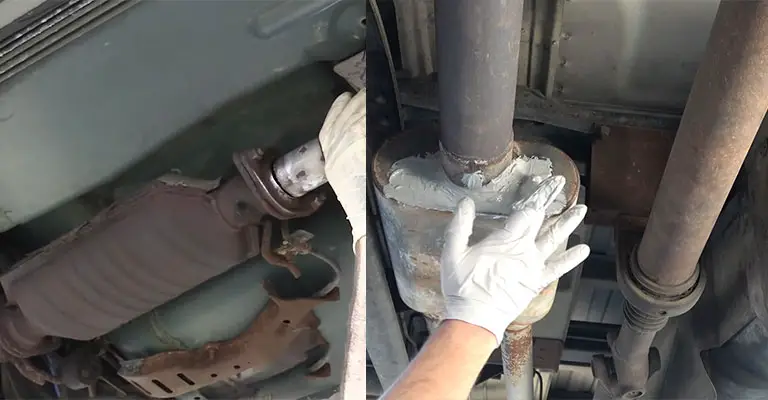
An exhaust leak can also cause sputtering. Anywhere can have an exhaust leak. You can find it in the manifold or farther under the car.
In addition to being noisy, exhaust leaks are dangerous as the exhaust is hot and can melt plastics or spill into the vehicle. Sputtering can also be caused by leaky gaskets on the engine, which affect the fuel mixture.
Water can be sprayed down exhaust pipes to find exhaust leaks by using a blower connected to the tailpipe. A leak exists anywhere that bubbles, so fix it as soon as possible.
6. Leak In The Intake Or Vacuum System
If a leak around the intake manifold or at the hoses from the intake manifold, your car engine may sputter if the mixture is too lean.
EVAP smoke machines make it easy to find this. If you don’t have one at home, you can also listen for high-pitched sounds around the engine bay when the engine is idle to find leaks.
7. An Unreliable Fuel Pump
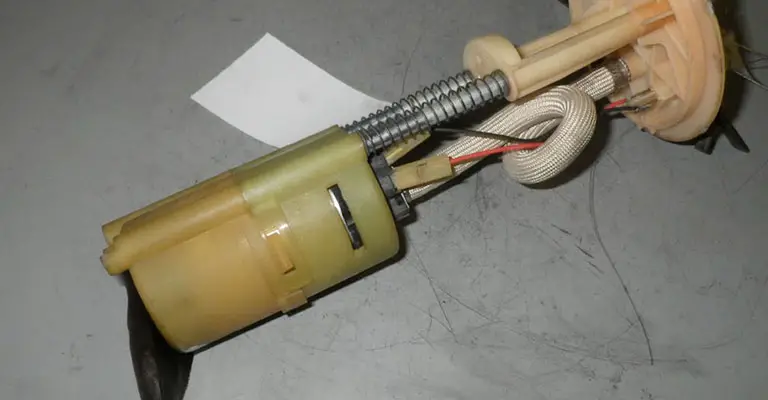
Another possibility is that your fuel pump is failing. Gas is moved from the tank to the cylinders by the fuel pump. Therefore, there is a possibility that it is not moving the right amount of gas through if it becomes weak.
Furthermore, if the fuel pump is malfunctioning, you may notice sputtering when your fuel level is low but not when it is full.
Spray the fuel into the cylinder before starting the car to see if it is the fuel pump. It is most likely the fuel pump is going out and needs to be replaced if it starts fine.
8. Air Filter Clogged
A dirty air filter prevents the proper amount of air from sputtering. Ensure enough air flows through the filter by replacing it or cleaning it. A clogged air filter is connected to dirty sensors.
9. Sensors That Are Dirty Or Bad
The car also starts using a variety of sensors. A fuel injection sensor, an oxygen sensor, and a mass airflow sensor are all part of your system.
Unless one of these components is clean or is going bad, the car won’t get a suitable gas mixture when you start it. So, when you start the machine, it will sputter.
Make sure all sensors are clean and that they are not the cause of the problem. If the problem persists even after cleaning or replacing them, something else is at fault.
10. Fuel Injectors With Faults
It is also possible that the fuel injectors are dirty, resulting in insufficient fuel being delivered to the cylinder. If the problem appears when fuel is ignited, you might consider cleaning them.
11. Spark Plugs That Are Dirty Or Bad
Your car’s spark plugs may also be dirty or damaged if it sputters when starting. Getting an engine started requires a spark, and dirty spark plugs may not provide enough spark to ignite the fuel, resulting in a rough start.
While the engine is running, you may not notice the sputtering as easily because of all the other noise. After changing or cleaning your spark plugs, the sputtering will stop if that is what is causing the problem.
Final Words
It is normal to drive smoothly, but if you notice your engine sputtering, the first thing you should check is your fuel level.
Full fuel gauges, however, can indicate further engine issues. Fuel may not reach the combustion chambers due to a blocked fuel filter, for example.
Instead of immediately starting the engine the next time the vehicle is parked, turn the ignition switch to the running position, so the dash lights come on for two seconds, then turn it off.
Try starting the engine after repeating this half a dozen times. The problem is likely with the fuel pump check valve, which allows fuel to drain back into the gas tank as the vehicle sits.
If the engine starts right up and runs smoothly, then there is a problem with the fuel pump check valve.




